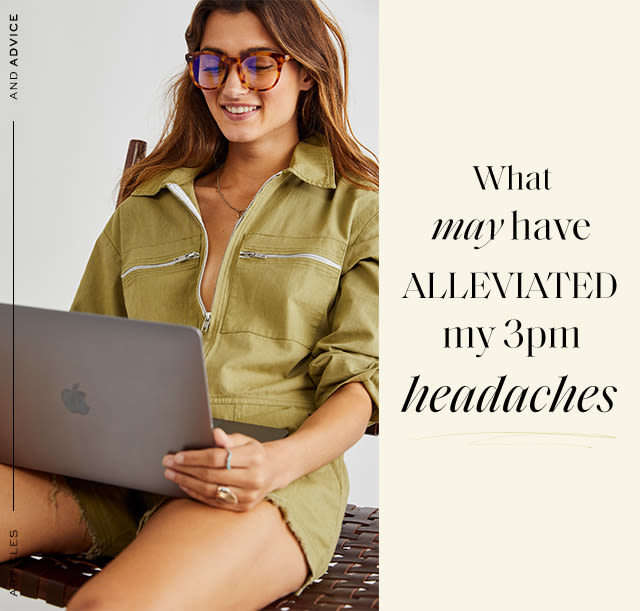
A surprising remedy from...the accessories team.
My recent foray into blue-light lenses left me a little, well, confused.
To back up: blue light — the kind that emanates from your computer, phone and TV — promotes wakefulness. When you’re scrolling through Instagram or binge-watching TV, you probably don’t notice it, but when overexposure (e.g. sitting on your laptop at work all day) occurs, it can lead to strained vision, a disrupted sleep cycle, and, for me, terrible 3pm headaches.
Blue-light glasses, then, seemed like an easy remedy: they promised to diffuse harsh blue light, prevent blurry vision, reduce headaches and ultimately lead to a better night’s sleep. In other words, a bit of “digital wellness.”
So, why not give them a full in-spec-tion?
To back up: blue light — the kind that emanates from your computer, phone and TV — promotes wakefulness. When you’re scrolling through Instagram or binge-watching TV, you probably don’t notice it, but when overexposure (e.g. sitting on your laptop at work all day) occurs, it can lead to strained vision, a disrupted sleep cycle, and, for me, terrible 3pm headaches.
Blue-light glasses, then, seemed like an easy remedy: they promised to diffuse harsh blue light, prevent blurry vision, reduce headaches and ultimately lead to a better night’s sleep. In other words, a bit of “digital wellness.”
So, why not give them a full in-spec-tion?
For a week, I diligently wore my handsome Westons, typing away on my computer and furrowing my brow to focus. The glasses cast a slightly yellow tint, cancelling out the blue light. The lenses, meanwhile, are crystal clear and I didn’t feel my eyes straining. There wasn’t a reflection or glare either.
In fact, it didn’t feel like...anything.
As it turns out, that’s the genius. According to my coworker Ali, an analytics guru and blue-glasses devotee, she only notices the harsh effects of blue-light overexposure (think: headaches, tension around her eyes) when she forgets to wear them. I challenged other FP Team members to give them a go and they reported similar effects:
“It definitely felt like my eyes were able to relax more.”
“When I pull late nights and wear my glasses, I find the light of my laptop way less severe (and ache-inducing).”
For someone who’s used to the obvious effects of other products (remember that self tanner?), it took me a moment to celebrate their subtle payoff.
Next time, I’ll try wearing them at home. As someone guilty of scrolling through her phone at all hours of the night, I’m curious how they’ll affect my slumber. But if they’re as good at lulling me to sleep as they are at warding off my 3pm headache, then, as the saying goes: the eyes have it.
In fact, it didn’t feel like...anything.
As it turns out, that’s the genius. According to my coworker Ali, an analytics guru and blue-glasses devotee, she only notices the harsh effects of blue-light overexposure (think: headaches, tension around her eyes) when she forgets to wear them. I challenged other FP Team members to give them a go and they reported similar effects:
“It definitely felt like my eyes were able to relax more.”
“When I pull late nights and wear my glasses, I find the light of my laptop way less severe (and ache-inducing).”
For someone who’s used to the obvious effects of other products (remember that self tanner?), it took me a moment to celebrate their subtle payoff.
Next time, I’ll try wearing them at home. As someone guilty of scrolling through her phone at all hours of the night, I’m curious how they’ll affect my slumber. But if they’re as good at lulling me to sleep as they are at warding off my 3pm headache, then, as the saying goes: the eyes have it.